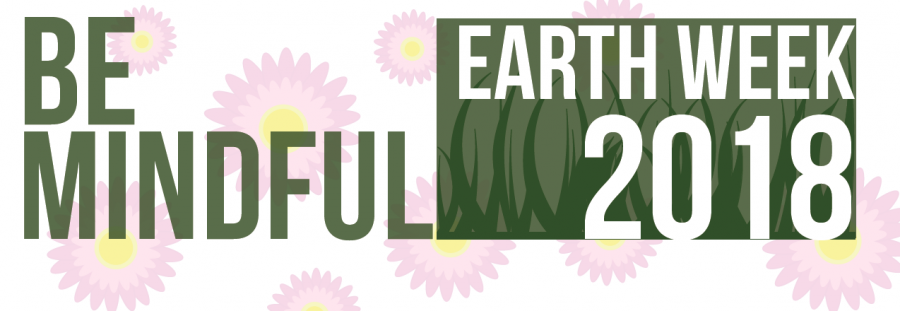Be mindful: Earth Week 2018
April 19, 2018
History of Earth Day
Every year on April 22, Earth Day marks the anniversary of the birth of the modern environmental movement in 1970. Before then, there were no legal or regulatory mechanisms to protect the environment — there was no Environmental Protection Agency, no Clean Air Act, no Clean Water Act, no Endangered Species Act.
In the spring of 1970, Senator Gaylord Nelson created Earth Day as a way to put environmental issues onto the national agenda. That spring, 20 million Americans demonstrated in different U.S. cities. Thousands of colleges and universities organized protests against the deterioration of the environment.
The first Earth Day was effective at raising awareness about environmental issues and transforming public attitudes. According to the EPA, “public opinion polls indicate that a permanent change in national priorities followed Earth Day 1970. When polled in May 1971, 25 percent of the American public declared protecting the environment to be an important goal, a 2,500 percent increase over 1969.”
Congress authorized the creation of a new federal agency in December 1920 to address environmental issues, the U.S. Environmental Protection Agency. As 1990 approached, Earth Day went global, mobilizing 200 million people in 141 countries and shifting the status of environmental issues onto the world stage. Earth Day 1990 ultimately helped pave the way for the 1992 United Nations Earth Summit in Rio de Janeiro.
Many countries around the world continue to recognize Earth Day today. In fact, the University recognizes the need for continued environmental activism and awareness with Earth Week. Different environmental organizations and clubs on campus have planned events aimed at increasing knowledge of sustainability for the campus to participate and engage in during Earth Week.
Earth Week at the University
The Environmental Club was able to organize a week’s worth of events with an activity occurring on campus each day. Sustainability Coordinator, Debbie Namugayi, notes that “the biggest change from past years is that this is a customized week of events that’s very student-focused and themed.” The theme this year was “Be Mindful.”
Fact sheets were scattered on April 16 on tables in Bostwick Marketplace and the Bison promoting “Meatless Monday,” to spread awareness of the sustainable benefits of going meatless. On April 17, the club advertised “Truth Tuesday” and hung flyers around campus containing alarming facts about environmental issues. On April 18, club members tabled in the Elaine Langone Center mall from 11a.m.-1p.m. selling reusable mug stickers that can be placed on students’ own reusable mugs and entitles them to a $0.25 discounted drink price on campus.
Also on April 18, members tabled in Bostwick Marketplace promoting the reusable to-go container option and in the evening, they partnered with the Office of Sustainability for “Weigh Your Waste” where they educated the community about the waste we produce. Members of the Environmental Club stood in front of the tray collection belt and had students scrape off their food waste into buckets. From 5-7pm, 55 pounds of leftovers were collected.
“We really made people more aware of the fact that they were wasting food and a lot of people really appreciated our efforts to bring food waste into the forefront of student’s minds,” Environmental Club President Ashley Vecchio ’20 said.
On April 20, there will be volunteers working with the Office of Sustainability at Bison Sound promoting waste-sort education. And finally, on April 22, the Environmental Club is teaming up with the Office of Sustainability to conduct a Campus Clean Up starting behind Vedder Hall at 1 p.m.
“We are trying to promote awareness. We want people to recognize what environmental issues are out there but also to understand that there are ways for them to help,” Vecchio said. We are advertising small ways in which students can get involved with sustainability on campus and in their own lives. We are trying to convey that being sustainable is not some far reaching idea, it is something people are already doing and something students at Bucknell can easily incorporate into their lifestyles.”
Separate from the Environmental Club, the Office of Campus Sustainability hosted a movie screening on the night of April 16, showing the documentary “The Minimalists.” On April 21, they are hosting an Adopt-a-Plant event between McDonnell and Swartz Halls.
Earth Week is a great way to raise awareness about environmental issues, but Vecchio reminds us that “Earth Week isn’t the only time we should be caring about the environment or acting sustainably, but it is a great start. It starts the conversation about sustainability and raises awareness to encourage year-long and life-long changes.”
Namugayi encourages students to “think before you throw something away to make sure you are recycling and throwing away your trash correctly. Look at what you purchase and your daily habits and actions to see where you can change to be more sustainable.”
Achieving a more sustainable campus is attainable, and this year’s Earth Week encourages students to really think about the ways in which they can begin to “Be Mindful.”
“Baby steps!” Vecchio said. “Sustainability is not scary, hard, or impossible. It is an aggregate of small actions taken to better treat your surroundings. Tons of things can contribute to a more sustainable lifestyle.”
Why not start this week?






















